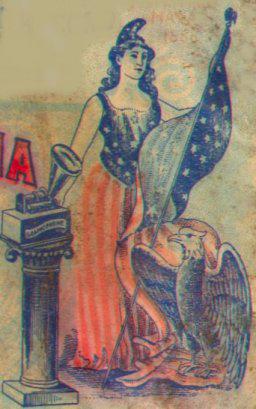I’ve always found Uncle Sam mildly irritating. The aversion is half-rational—he is an old, white patriarch assumed to represent the whole country—and half-fanciful: He seems like a creepy relative. The fact that he’s usually beckoning you to do things for him does not relieve the sleaze factor. (Granted, they are typically noble things like going to college or buying a war bond.) His scowl, too, conveys disapproval or perhaps menace.
Luckily, we have a better alternative. In the Atlantic this week, Garance Franke-Ruta unfolds the history of Columbia, Uncle Sam’s lesser-known sister. As a personification of the United States, Columbia is far less sinister and far more charismatic than her coattailed counterpart: She’s the goddess-like figure who inspired all the women in breastplates from the women’s suffrage marches of 1913. Uncle Sam entered the visual lexicon in 1916. (He’d been around as an American symbol for at least a century, but his appearance wasn’t standardized.) Columbia, though, is even older: She dates back to 1738, when the British Gentleman’s Magazine used her name as a poetic synonym for America. By the 1770s, she’d been fleshed out as a woman—imposing, warlike, draped in stars and stripes. The black poet Phillis Wheatley, herself a protofeminist, imagined the nations of the world fixing their “hopes” in “Columbia’s arm” in a 1776 lyric. Franke-Ruta writes:
From the 18th century until the early decades of the 20th, Columbia was the gem of the ocean … . She was honored from the birth of the nation—‘Hail, Columbia!’, whose score was first composed for the inauguration of President Washington, was an unofficial anthem until the ‘Star-Spangled Banner’ displaced it as the official national one in 1931—to the birth of the recording and film industries, which is why we have had Columbia Records and Columbia Pictures. Yes, that lady with the torch at the start of the movies isn’t just some period-costume-wearing chick—she is a relic of this earlier personification of America, immortalized forever by the most American of industries.
She lent her name to Columbia University and CBS (originally Columbia Broadcasting System) and our nation’s capital, the District of Columbia. And she joined a sisterhood of martial maidens who, taking the Greek goddess Athena as a model, watched over the world’s countries: Britannia of England, Germania of Germany, Turrita of Italy, Marianne of France. But Columbia receded from view during the 1920s (supplanted by her dopey brother, Uncle Sam), in part, Franke-Ruta speculates, because the expanding role for real women in civic life made an allegorical female figure seem regressive. Columbia may also have alienated Americans by appearing in posters that romanticized the suffering of World War I. Her character may have been subsumed into the myth of Lady Liberty.
Columbia lives on, though, in a series of cartoons and bulletins (reproduced on the Atlantic website) that show her welcoming oppressed German immigrants and defending Chinese Americans against nativist hate. Hipsters, take note: She even advocates locally grown food. It’s clear that our country’s Xena Warrior Princess spirit guide kicked butt, far more than the ever-grimacing weirdo who currently serves as the national mascot. If we can’t get her to replace Uncle Sam, at least maybe she can co-star in the next Captain America movie.
